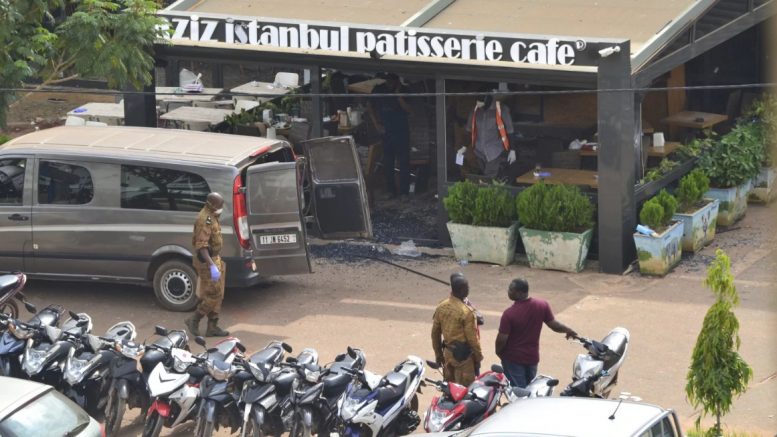This week has been a particularly bloody one for sub-Saharan, West Africa mining nations, with major terrorist attacks on targets a day apart in Burkina Faso and Mali.
In Burkina Faso’s capital Ouagadougou on Aug. 13, two attackers arriving on motorcycles — described as “very young” by one witness — shot dead 16 people, including at least eight foreigners, in a Turkish restaurant named Aziz Istanbul in what Burkina Faso President Roch Marc Christian Kaboré condemned as “a despicable attack that has Ouagadougou in mourning.”
The restaurant was said to be packed with foreigners, who had gone to spend the evening watching soccer on TV.
In a counter assault that lasted until morning, the two attackers were killed by state security forces, five of whom were among the additional 22 people wounded, according to Agence France Presse. Some 40 people were freed by the counter assault.
At press time, there had been no claim of responsibility for the attack, but it bears the hallmarks of the extremist attacks that have plagued West Africa since the ill-judged toppling of Muammar Gaddafi’s regime in Libya in 2011.
Global Affairs Canada identified the Canadian victims as Cambridge University PhD student and former Toronto schoolteacher Tammy Chen, who was newly married and pregnant; and Bilel Diffalah, who was a volunteer for Montreal-based Centre for International Studies and Cooperation. Other foreigners killed included a Frenchman, two Kuwaiti women and male victims from Senegal, Niger, Lebanon and Turkey.
Global Affairs Canada has revised its risk level assessment for Burkina Faso to “exercise a high degree of caution due to the threat of terrorism,” even if there is no nationwide advisory in effect. Global Affairs says to avoid all travel to Burkina Faso’s northern area and the border with Mali, as well as the W National Park, due to the threat of terrorism and the area “north of the Tougan-Ouahigouya-Djibo-Dori line — up to the Mali and Niger borders — and within 80 km of the rest of the Burkina Faso-Mali border, due to the threat of banditry and kidnapping.”
The Aziz Istanbul restaurant is only 200 metres from the Splendid hotel and Cappuccino restaurant targeted in a January 2016 assault that left 30 people dead — including six Canadians — and 71 wounded, many of them foreigners. Al-Qaeda in the Islamic Maghreb (AQIM) claimed responsibility for the slaughter.
A dozen soldiers were also killed in December in an assault on an army base in Burkina Faso’s northern region.
In November 2015, Islamist militants took 170 hostages and killed 20 of them in a mass shooting at the Radisson Blu hotel in Mali’s capital city Bamako. The death toll could have been much higher without the Malian commandos raiding the hotel and freeing hostages. The terrorist group Al-Mourabitoun claimed that it carried out the attack in cooperation with AQIM.
And last March, in an attack also claimed by AQIM, 19 people were killed when gunmen stormed the Ivory Coast beach resort of Grand-Bassam.
On Aug. 14, 2017, unidentified gunmen attacked the headquarters of the UN peacekeeping force in Timbuktu in northern Mali, killing seven people and injuring seven others in what the mission’s chief called a “terrorist” attack. Other gunmen then attacked two neighbouring UN camps in Douentza in the Mopti region of central Mali, killing a Malian soldier and a UN peacekeeper, and wounding another peacekeeper.
The UN peacekeeping mission in Mali is now the deadliest of the UN’s 16 global peacekeeping operations, and the latest soldier’s death was the ninth UN peacekeeper killed in attacks this year in Mali.
According to French media, French President Emmanuel Macron is concerned with the chaos flaring up in the former French colonies in West Africa, and is urging an earlier launch of a five-country, anti-insurgency force in the Sahel.
France already has a sizable military presence in the region under its “Operation Barkhane” anti-terrorist program created in mid-2014 and based in relatively stable Chad, but Macron wants to set up another 5,000-member force — manned by soldiers from Chad, Niger, Mali, Burkina Faso and Mauritania — by October. The force would need US$470 million in new funding from the European Union.
Burkina Faso has become Africa’s fifth-largest gold producer after South Africa, Ghana, Tanzania and Mali. Over the past two decades most foreign gold mining companies and their personnel on the ground have had genuine affection for the welcoming and peaceful local population, and hoped modern gold mining carried out to international standards could bring wealth to the 18 million people living in one of the world’s poorest countries.
But two years of mass killings of foreigners in the region and last year’s coup d’état in Ouagadougou show miners’ carefree days of the late 1990s and early 2000s in Burkina Faso are long gone.




Be the first to comment on "Editorial: Terrorist attacks plague Burkina Faso"